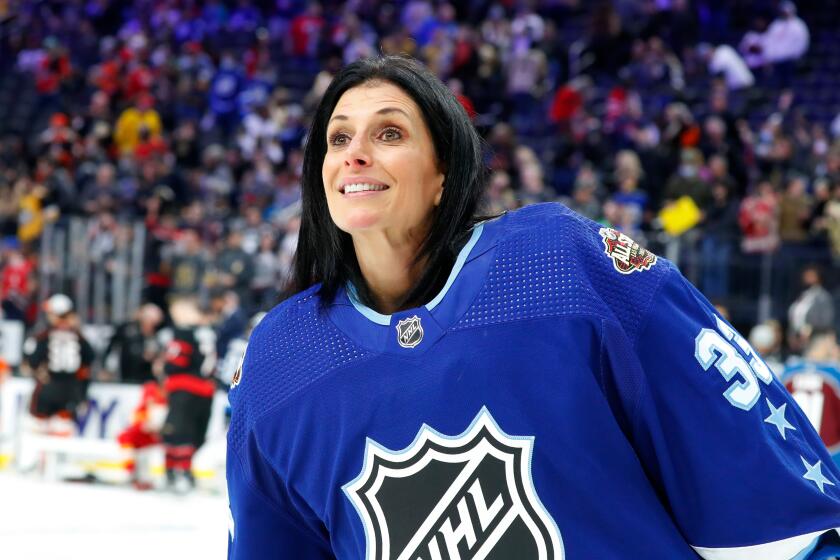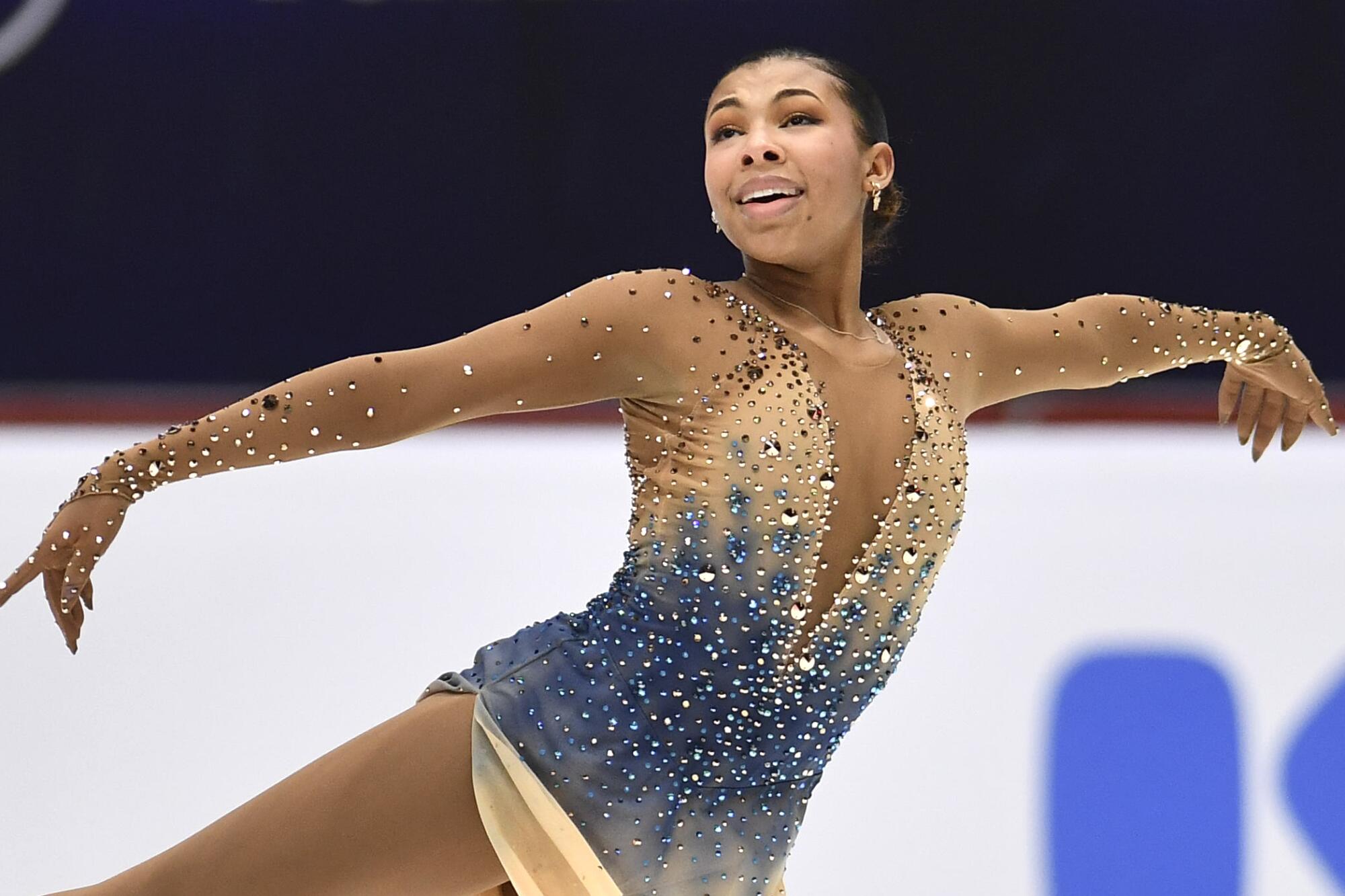
- Share via
Toshawa Andrews wanted to give her second child a name that would fit the destiny she envisioned for her baby girl. She had a favorite in mind, but she feared it wouldn’t sound weighty enough when her daughter grew up.
“When she was born I was thinking, ‘What if she’s an attorney or goes into some professional field, something like that?’” she said. “Although I wanted her first name to be Starr, I just thought, I don’t know what field she’s going to choose. So I named her Kennedy Starr, though I ended up calling her Starr, anyway.”
That baby has lived up to her name. Starr Andrews of Inglewood is a bright, shining light in the figure skating world, a battler who conquered a long-undiagnosed heart issue to become the first Black American to win a medal in the annual Grand Prix competition series.
Starr, 21, landed six triple jumps in her free skate program at Skate Canada last month, earning a second-place finish that was exhilarating and historic. She was more than a little surprised, because she had started the season slowly after undergoing surgery last spring to burn off an extra nerve to her heart. Supraventricular tachycardia had caused her heart to beat alarmingly fast and left her feeling faint.
“The first time it happened I called my mom and said, ‘Mom, I don’t want to die,’ because I didn’t know what was happening. I was terrified,” said Starr, who began having episodes when she was about 13. “I’d push off the wall and it would happen and I’d be like, ‘Oh, I have to sit down until it goes away.’ I don’t have to worry about that anymore, so that’s really nice.”
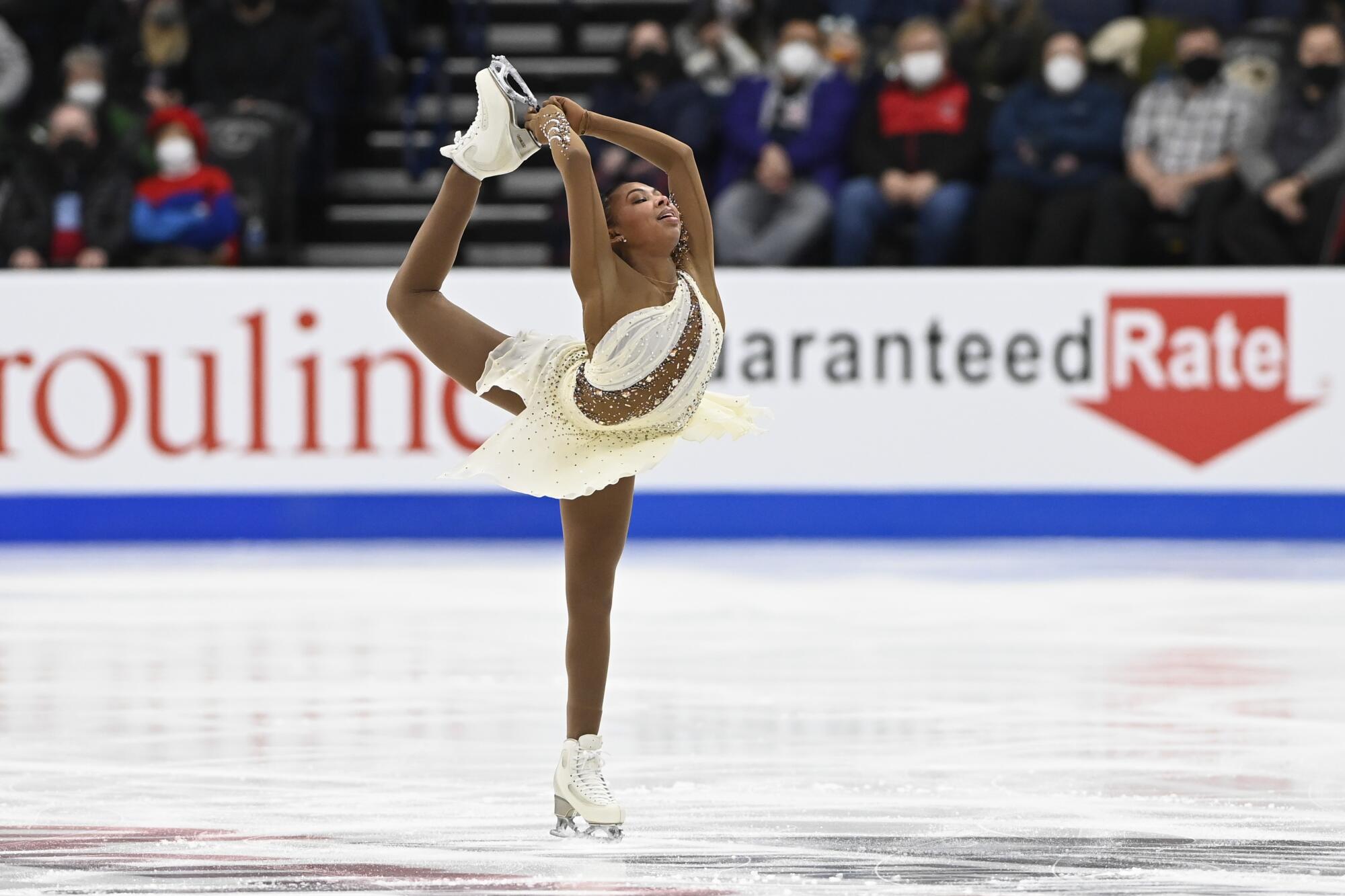
She trained well for Skate Canada but couldn’t believe she had earned personal-best scores for her routine to Lara Fabian’s “Je Suis Malade” and her overall performance. Sitting beside longtime coach Derrick Delmore, she did a comical double take when her scores were announced. Her reaction was genuine. So was her gratitude at solidifying her place as a role model in a sport that has had few Black competitors.
“Making history is mind-blowing to me,” she said recently at her home rink, Lakewood Ice. “It’s huge. It’s breaking barriers and paving a way for other young athletes like me and letting them know it’s possible that they can do it. I think it’s so cool.”
Black figure skaters are rare. Racism prevented spectacularly talented Mabel Fairbanks from competing for U.S. or Olympic titles in the 1930s, but she became a coach in Los Angeles and was elected to the U.S. Figure Skating Hall of Fame. She coached Atoy Wilson, who in 1965 became the first Black skater to compete at the national championships. She also paired Tai Babilonia — who has Black, Filipino, and Hopi heritage — with Randy Gardner. They qualified for two Olympics and won the 1979 world pairs title before the Grand Prix series was established.
Elliott: Mabel Fairbanks’ story deserves to be told. Two of her protégés are working to do so
Racism deprived Mabel Fairbanks the chance to become a figure skating champion in the 1930s. As a coach, she made sure her Black students got those opportunities.
Debi Thomas, who won U.S. and world titles and a bronze at the 1988 Olympics, also competed before the Grand Prix series began in 1995. Surya Bonaly of France, famed for her backflips, finished second at three world championships and won medals at events that later became part of the Grand Prix series.
Andrews said she has read racist comments about herself on social media but hasn’t heard slurs uttered to her face. She and her mom often were the only Black people in her rink, though she didn’t think much about it until she got older. “It did make me a little more uncomfortable. But at the same time I was like, ‘I’m an athlete. I’m here because I put the work in and I’ve been training so hard and at the end of the day we’re all here to do the same thing,’ ” she said. “We’re all here to skate our best and because we love it.”
Andrews knows her skating history and she was honored to become the first beneficiary of a financial grant from the Mabel Fairbanks Skatingly Yours Fund. “She was an amazing woman, she was so strong,” said Andrews, who is scheduled to compete this weekend at the NHK Trophy Grand Prix in Sapporo, Japan. “It makes me feel honored and so special because she was amazing and she had the prettiest split jump.”
“To go from whipping my hair to winning a Grand Prix medal is amazing. It’s been such a journey.”
— Starr Andrews
The aid kept her going in a costly sport. Her mom, known as Tosh, can’t work because she has microvascular coronary dysfunction, which she said is unrelated to Starr’s heart problems. Tosh, who was a recreational skater, said she’s had 13 heart attacks, one stroke, and three near-death experiences.
“I’ve done a lot of sacrificing and went without a lot,” Tosh said. “I’ve had a lot of community support. I’ve had support from U.S. Figure Skating. I’ve done GoFundMe. I’ve cut back a lot of things with my lifestyle in order to help her move forward.
“I’m really happy that she’s coming to a happy place, I think, in skating because it’s definitely a journey that’s up and down and when you have those smaller victories, hey, you’ve got to give back praise.”
Starr first made a splash when she was 9 and performed a precious routine to Willow Smith’s “Whip my Hair” at a recital. The video has more than 57 million views on YouTube.
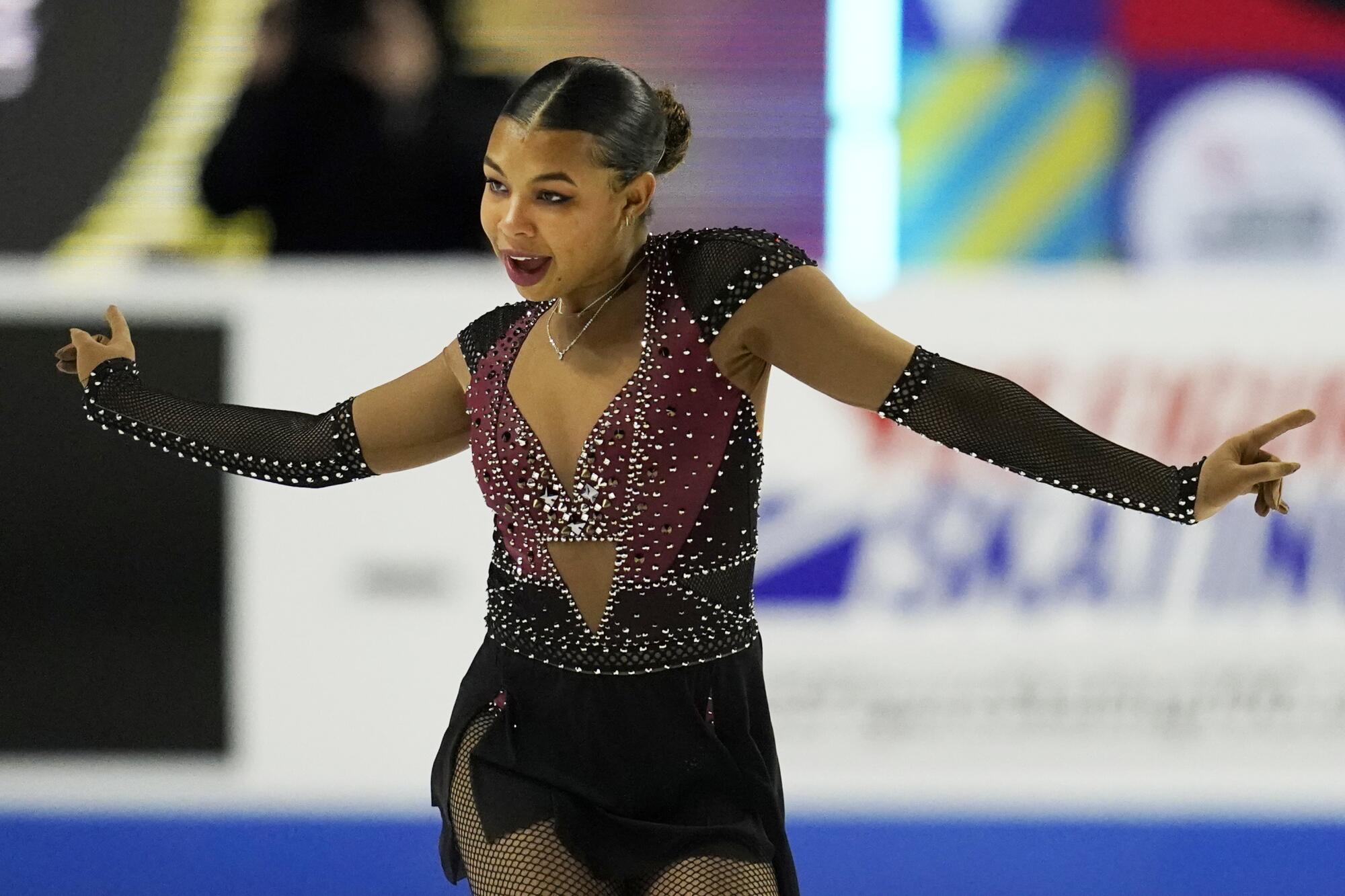
It would be sad to peak so young. Starr has endured through disappointments.
She missed the 2018 Olympic team because it was her first year at the senior level and she wasn’t at that standard. She finished ninth at the 2022 U.S. championships and missed a berth at the Beijing Games, but she’s hoping to make the U.S. team for the 2026 Milano Cortina Games.
“To still be in the sport is already a huge accomplishment because this sport is hard,” she said. “It’s very difficult mentally and physically. To go from whipping my hair to winning a Grand Prix medal is amazing. It’s been such a journey.”
The “Whip My Hair” video caught the attention of Babilonia, a staunch guardian of Fairbanks’ legacy. Babilonia met Andrews at the Century City mall, where they had frozen yogurt and Babilonia used the window of a department store as a mirror to teach Andrews to gracefully bow at the end of her routines.
Manon Rheaume, who played goalie in an exhibition for the Tampa Bay Lightning 30 years ago, is now a member of the Kings’ player development department.
“Everything counts until you get into your car in the parking lot, that’s what Mabel taught us,” Babilonia said. “We’re all so proud of Starr. She’s a beautiful young lady inside and out. I hope she takes it to the top.”
Delmore, Andrews’ coach, admitted they butted heads during her teenage years. They’ve since developed a strong trust that’s lightened by frequent smiles.
“She has oodles and oodles of talent and that was apparent at an early age, when her mom first asked me to work with her,” said Delmore, a former pairs skater. “She’s so good. I think she has a really bright future ahead of her.
“It’s nice to see her realizing these dreams that she has, achieving these goals that we really believed she could achieve when she was young. To see this all coming to fruition all these years later, it’s amazing to see.”
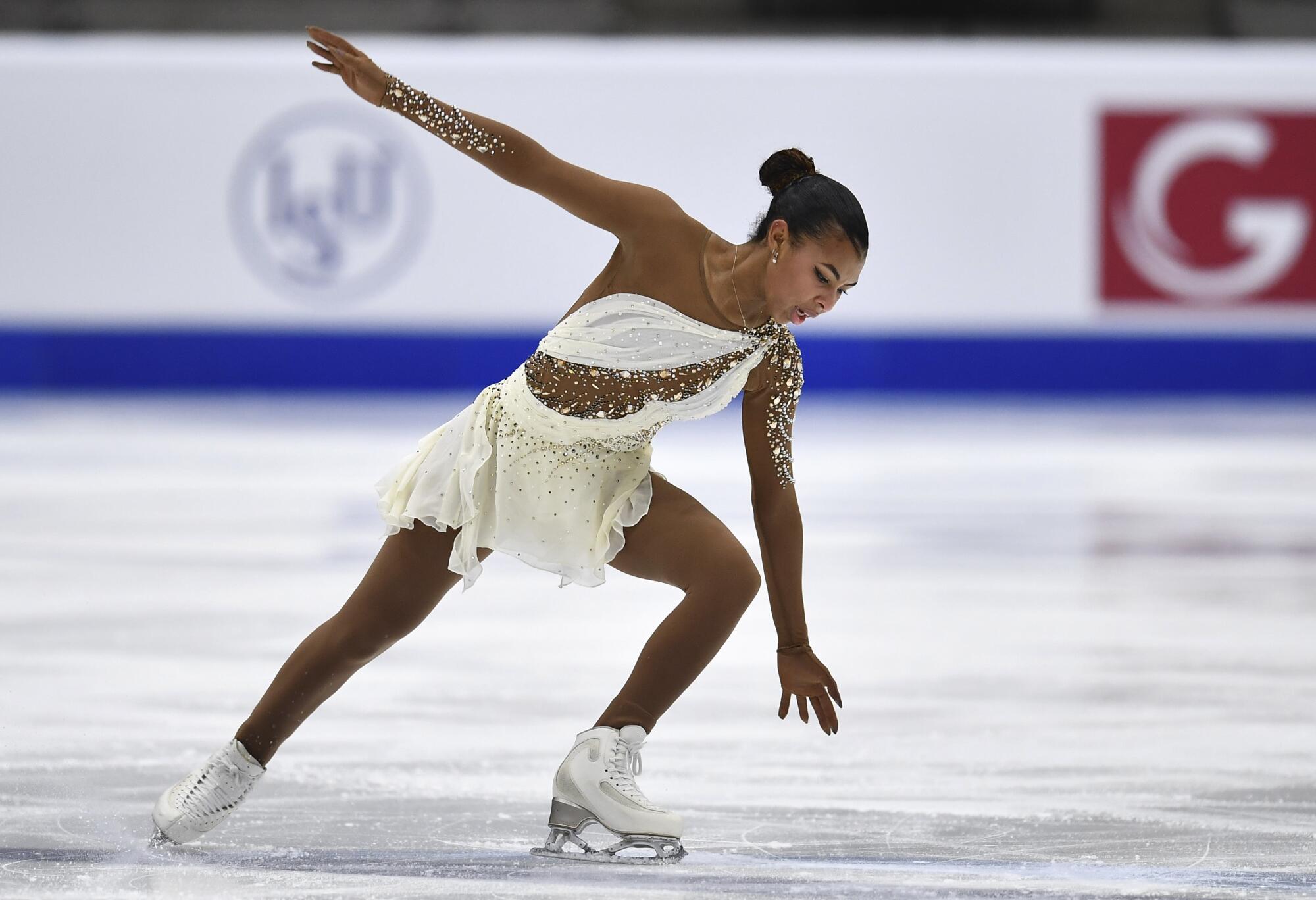
Andrews has practiced triple axels and quadruple jumps, which rate high in the point-based scoring system, but she doesn’t plan to put them in her programs for a while. In the meantime, she’s still whipping her hair, still loving the sport.
“To see how far I can go and the thought of improving, for me, is what keeps me going as well,” she said. “This year I’ve definitely improved a lot in my skating and in my mental approach as well. Last year was really difficult for me. I was all over the place, actually. This year has been a huge improvement.
“I felt like I was skating not to please everybody, but it wasn’t for myself. This year I think that has changed a lot.”
As her mom predicted, she’s a star, no matter how you spell it.
More to Read
Go beyond the scoreboard
Get the latest on L.A.'s teams in the daily Sports Report newsletter.
You may occasionally receive promotional content from the Los Angeles Times.

